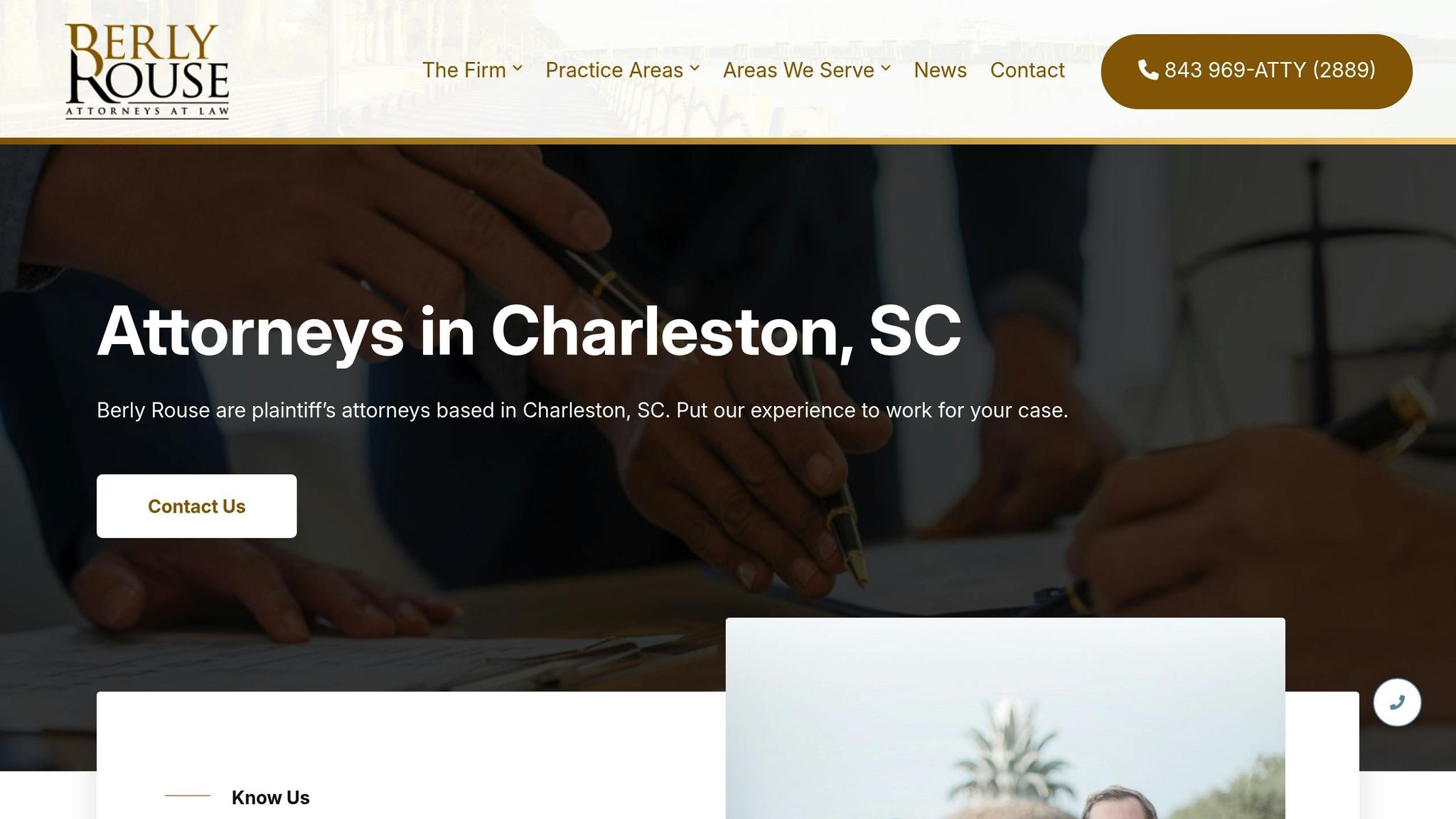Common Workplace Injuries in South Carolina
Story by Joel Berly
July 23, 2025

Workplace injuries in South Carolina impact employees across industries like construction, healthcare, and manufacturing. In 2023, the state reported 30,100 nonfatal workplace injuries, with a recordable case rate of 1.9 per 100 workers – lower than the national average of 2.4. Sprains, cuts, burns, and respiratory illnesses are the most frequent injuries, often linked to repetitive motions, falls, or exposure to hazardous materials. High-risk sectors include construction, manufacturing, transportation, and healthcare, with transportation-related incidents leading in fatalities.
South Carolina’s workers’ compensation system is no-fault, ensuring benefits for injured employees regardless of fault. Coverage includes medical expenses, wage replacement, and disability benefits, with most businesses required to provide insurance. However, exceptions apply to certain small businesses and specific worker categories. Employees must report injuries promptly and follow employer-directed medical care to secure benefits.
For severe or disputed cases, legal assistance can help navigate complex claims and protect workers’ rights. Employers and employees must prioritize safety through training, hazard prevention, and compliance with safety standards to reduce risks.
Most Common Workplace Injuries
Understanding the most frequent workplace injuries in South Carolina can help reduce accidents and improve safety. Each year, workplace injuries result in about $58.61 billion in workers’ compensation payments across the U.S.. Below are some of the most common types of injuries and their typical causes.
Sprains and Strains
Sprains and strains top the list of workplace injuries, impacting muscles, ligaments, and tendons. These injuries are especially common in industries like construction, warehousing, and manufacturing, where heavy lifting and repetitive motions are part of daily tasks.
Healthcare workers are particularly vulnerable, being seven times more likely to experience these injuries compared to other professions. Sprains involve stretched or torn ligaments, while strains affect muscles or tendons. The severity can range from mild discomfort to significant impairment. Such injuries may develop over time due to repetitive stress or occur suddenly, often during lifting incidents when proper techniques aren’t used.
Cuts, Lacerations, and Fractures
Sharp tools, heavy machinery, and equipment in workplaces across South Carolina often lead to cuts and lacerations. These injuries can vary from minor scrapes to deep wounds requiring emergency medical attention. Manufacturing jobs, with their reliance on sharp instruments and large machinery, are particularly hazardous.
Fractures and broken bones are also common, frequently caused by falls or machinery-related accidents. Falls alone account for roughly 35% of workplace incidents, making them a leading cause of serious injuries like fractures. While minor cuts might heal quickly, severe lacerations or compound fractures can require extended recovery times, multiple surgeries, and even result in long-term complications.
Burns and Respiratory Illnesses
Burns – whether thermal, chemical, or electrical – are another common workplace hazard. Workers in industries like restaurants, manufacturing, and construction face higher risks due to their exposure to hot surfaces, chemicals, and electrical equipment. In 2019, restaurant workers nationwide reported around 93,800 nonfatal injuries and illnesses.
Respiratory illnesses are also a concern, especially for workers exposed to chemicals, dust, or biological agents. Unlike acute injuries, these conditions often develop over time from repeated exposure. Workers’ compensation typically covers the costs of diagnosis, treatment, and lost wages for such illnesses. Chemical burns, for instance, require immediate care to minimize permanent damage, while electrical burns – though they may look minor – can cause severe internal injuries. Similarly, respiratory conditions may not show symptoms right away but can progress into chronic illnesses, sometimes forcing workers to reevaluate their career options.
Recognizing these injuries is crucial for navigating South Carolina’s workers’ compensation system effectively.
High-Risk Industries in South Carolina
In 2023, South Carolina reported 112 fatal workplace injuries, with certain industries facing significantly higher risks. Below, we break down the hazards in these sectors, providing insight into where safety measures are most urgently needed and how they relate to workers’ compensation claims.
Transportation-related incidents stood out as the leading cause of workplace fatalities, accounting for 39% of the total. Beyond transportation, specific industries and job roles consistently show injury rates higher than the state average.
Manufacturing and Construction
The construction industry recorded 31 fatalities in 2023, the highest among all sectors, emphasizing the dangers workers face daily.
Construction sites are filled with risks: heavy machinery, work at dangerous heights, electrical equipment, and sharp tools all contribute to the sector’s high injury rates. Falls, slips, and trips alone caused 10 fatalities, with specialty trade contractors experiencing 17 of the total deaths. The Occupational Safety and Health Administration (OSHA) has highlighted the "fatal four" hazards in construction – falls, being struck by objects, getting caught in or between objects, and electrocutions. Nationwide, these hazards were tied to 63.7% of construction worker deaths in 2016.
Manufacturing, while different in its challenges, also presents notable risks. This sector is a major economic driver in South Carolina, employing nearly 12% of the state’s workforce and generating almost $40 billion annually. In 2023, the Total Recordable Cases (TRC) rate for manufacturing was 2.1 per 100 full-time workers. Common injuries include workers being caught in machinery, struck by objects, or exposed to harmful chemicals. Forklifts, for instance, are a significant hazard – nationally, they were linked to 70 fatalities and 7,290 nonfatal injuries requiring time off work in 2021.
Healthcare and Transportation
While construction and manufacturing highlight physical hazards, the healthcare and transportation sectors face their own unique challenges.
The transportation sector experienced 37 fatal injuries in 2023, with private transportation and warehousing reporting 20 fatalities in 2021. Vehicle accidents remain the primary risk for transportation workers, particularly for commercial truck drivers, delivery personnel, and warehouse staff involved in material handling. The Trade, Transportation, and Utilities sector recorded the highest TRC rate in South Carolina at 2.8 in 2023.
Healthcare workers, with a TRC rate of 2.3 in 2023, encounter different risks related to their environment. These include exposure to infectious diseases, hazardous drugs, and physical strain from lifting or moving patients. Such activities can lead to back injuries and musculoskeletal disorders. Additionally, healthcare staff face risks from chemical exposure, whether from cleaning agents or medications, and the stress of high-pressure situations.
| Industry Sector |
Total Recordable Cases Rate (2023) |
| Trade, Transportation, and Utilities |
2.8 |
| Education and Health Services |
2.3 |
| Manufacturing |
2.1 |
| Construction |
1.4 |
| Private Industry Average |
1.9 |
Even though construction has a lower overall injury rate compared to some sectors, the severity of its incidents is striking. This highlights how the inherently hazardous nature of construction work makes injuries more likely to result in fatalities compared to other industries.
South Carolina Workers’ Compensation Laws
Understanding how South Carolina’s workers’ compensation system works is important for both employees and employers. Below, we’ll break down eligibility requirements, how benefits are calculated, and the responsibilities each party has under the law.
In South Carolina, workers’ compensation operates as a no-fault system, meaning injured workers can receive benefits regardless of who caused the accident. As attorney Jeff Berger puts it:
"Workers’ comp is designed to provide benefits for people injured while working; in other words, if you got hurt at work, even if the accident was your fault, you can still file a workers’ compensation claim."
This system offers several types of benefits, including medical care, wage replacement, temporary or permanent disability benefits, and death benefits for families of workers who lose their lives on the job.
Who Qualifies for Workers’ Compensation
South Carolina law requires most businesses with at least four employees and an annual payroll exceeding $3,000 to provide workers’ compensation coverage. This applies to both full-time and part-time employees. The law covers injuries that occur while performing work-related duties, even if the incident happens off-site. For instance, a delivery driver injured in a car accident while making deliveries would typically qualify for coverage.
However, there are exceptions. The following groups are not required to have workers’ compensation coverage:
- Businesses with fewer than four employees or an annual payroll below $3,000
- Agricultural workers (unless the employer opts in voluntarily)
- Independent contractors (though disputes over misclassification can arise)
- Casual employees
- Railroad and federal employees
- Certain commission-based real estate agents
Additionally, injuries caused by intoxication or self-inflicted harm are not eligible for benefits.
When it comes to calculating benefits, workers generally receive two-thirds of their average weekly wage (AWW), up to a maximum limit. For 2025, the maximum weekly compensation for temporary total disability is $1,134.43. The AWW is based on the worker’s gross earnings over the 52 weeks before the injury, including overtime, bonuses, and tips.
Employee and Employer Duties
Knowing what steps to take after an injury is crucial for both employees and employers.
Employees: Notify your employer as soon as possible. Failing to report the injury within 90 days could result in losing your benefits. Make sure to inform a supervisor both orally and in writing. After reporting the injury, seek medical treatment from a doctor chosen by your employer.
Employers: It’s the employer’s responsibility to file the claim with their insurance provider and the South Carolina Workers’ Compensation Commission. Employees must also submit Form 50 or 52 within two years of the injury. If the employer does not file the claim, workers can contact the Commission directly for assistance.
There is a seven-day waiting period before benefits begin, unless the disability lasts longer than 14 days. It’s also worth noting that workers’ compensation benefits in South Carolina are generally not subject to taxes.
For severe injuries that lead to permanent impairment, compensation is often determined based on an impairment rating given by a physician once the worker reaches maximum medical improvement. In cases of total and permanent disability – such as paralysis or brain injuries – benefits may be provided for life.
sbb-itb-7016c6e
Legal Help for Workplace Injury Cases
Dealing with South Carolina’s workers’ compensation system can feel overwhelming. The process is packed with strict rules and often involves tough negotiations with insurance companies determined to limit payouts.
Why You Need a Workers’ Compensation Lawyer
Navigating Complex Rules and Deadlines
South Carolina’s workers’ compensation system has specific procedures and tight deadlines that can make or break your claim. A skilled lawyer ensures all paperwork is completed properly and submitted on time, minimizing the risk of denial over small errors. Missing a deadline or not following the correct steps can mean losing your benefits. The South Carolina Workers’ Compensation Commission (SCWCC) offers five levels of appeal, and an attorney can request hearings, challenge disputed claims, and even take your case to the South Carolina Court of Appeals or Supreme Court if needed.
Tackling Insurance Company Challenges
Insurance companies often try to dispute claims by questioning medical evidence or arguing that your injury isn’t work-related. An experienced attorney knows how to counter these tactics, using solid evidence, expert testimony, and strong legal arguments to fight for the compensation you deserve.
Building a Strong Case with Medical Evidence
A successful claim depends on presenting convincing medical evidence. Attorneys gather critical medical records, witness statements, and expert opinions to strengthen your case. They can also differentiate between pre-existing conditions and work-related injuries, arrange second opinions or independent exams at no cost, and estimate future medical expenses and disability costs.
Protecting You from Retaliation
Your lawyer will also work to protect your rights in the workplace, ensuring you’re shielded from any retaliation for filing a claim.
Reducing Stress During Recovery
Managing a workers’ compensation claim on your own can be incredibly stressful, especially when you’re already dealing with an injury. An attorney takes on the legal burden, helping you avoid costly mistakes and giving you the space to focus on healing. For tailored support, partnering with experienced legal professionals can make all the difference.

Berly Rouse Attorneys understands the challenges of workers’ compensation cases and offers the expertise needed to navigate South Carolina’s complex system. With offices in Charleston and Columbia, the firm provides skilled legal support to injured workers across the state.
Thorough Case Evaluation
The team conducts a detailed case evaluation to assess liability and damages, ensuring every aspect of your injury and its impact on your life is considered when pursuing compensation.
A Personalized Approach
"We take a personalized approach to ensure you feel supported and informed throughout the process."
No Upfront Costs
The firm works on a contingency fee basis, meaning you won’t pay any legal fees unless your case is successful.
Skilled Negotiation and Litigation
Berly Rouse Attorneys brings a strong focus to negotiations, using detailed evidence and expert testimony to secure fair settlements. If needed, they are fully prepared to take your case to court.
Free Initial Consultation
The firm offers a free consultation to discuss your workplace injury. During this meeting, they’ll evaluate your case, explain your legal options, and guide you through what to expect in the workers’ compensation process.
"At Berly Rouse, you can expect qualified, compassionate legal representation to help you get the compensation you deserve."
If you’ve suffered a workplace injury, speaking with a South Carolina workers’ compensation lawyer early on can make a big difference. Acting quickly helps protect your rights and ensures you meet all critical deadlines.
Conclusion
Workplace injuries affect a variety of industries across South Carolina, from manufacturing and construction to healthcare and transportation. Recognizing the most frequent injuries – like sprains, strains, cuts, fractures, burns, and respiratory illnesses – can help both employers and employees take meaningful steps to reduce risks. This understanding also lays the groundwork for exploring preventive measures and the legal options available to workers.
Safety in the workplace starts with effective prevention strategies. Employers are responsible for ensuring proper workers’ compensation coverage and enforcing safety measures. This includes offering regular safety training, performing routine hazard inspections, and providing employees with essential personal protective equipment (PPE). Employees also play a vital role by engaging in training sessions, reporting unsafe conditions, and using tools and equipment correctly.
"South Carolina OSHA is a proud state plan committed to the mission of making South Carolina a safe place to work and live by preventing workplace deaths, injuries and illnesses." – South Carolina OSHA
Even with the best precautions, accidents can happen. When they do, understanding your legal rights is crucial. South Carolina’s workers’ compensation system involves strict deadlines, detailed paperwork, and often complex negotiations with insurers. Challenges like disputes over medical evidence or concerns about employer retaliation highlight the importance of experienced legal support. Knowing your rights and seeking qualified legal advice can help ensure you receive the compensation and medical care you’re entitled to. Whether you’re an employer working to create a safer environment or an employee dealing with a workplace injury, informed decisions can safeguard both your health and your financial stability. For trusted legal assistance with workers’ compensation claims, the team at Berly Rouse Attorneys is ready to help.
Minimizing workplace injuries in South Carolina requires a collaborative effort. Employers and employees must work together to maintain safe conditions, follow established safety guidelines, and promptly address any concerns.
FAQs
What should I do right away if I get injured at work in South Carolina to protect my workers’ compensation rights?
If you’ve been hurt at work in South Carolina, acting quickly can help safeguard your rights to workers’ compensation. Here’s what you need to do:
- Inform your employer immediately. While South Carolina law gives you up to 90 days to report your injury, notifying your employer as soon as possible is always the smarter move.
- Get medical care right away. Even if your injury seems minor, it’s important to seek treatment promptly. Your employer may have a list of approved healthcare providers for you to visit.
- Submit a claim to the South Carolina Workers’ Compensation Commission within the required deadline. Filing on time is key to avoiding delays or denials of your benefits.
It’s also a good idea to keep thorough records of everything – injury reports, doctor visits, and treatments. These details can make all the difference if any issues arise with your claim.
How does South Carolina’s no-fault workers’ compensation system simplify filing a workplace injury claim?
South Carolina operates under a no-fault workers’ compensation system, meaning employees who get injured on the job can receive benefits without having to prove their employer was responsible. This setup streamlines the process, cutting down on delays and avoiding lengthy investigations into fault.
With this system, workers typically qualify for benefits like medical expense coverage, lost wages, and rehabilitation costs, provided the injury happened during their employment. The goal is to offer quick assistance to injured employees, helping them concentrate on healing rather than navigating legal battles.
What steps can employers and employees take to prevent common workplace injuries in high-risk industries like construction and manufacturing?
Creating safer workplaces in industries such as construction and manufacturing requires a shared commitment to safety from both employers and employees. Employers can take proactive steps by offering thorough safety training, ensuring workers have access to personal protective equipment (PPE), and scheduling routine equipment checks. Setting up clear safety procedures and encouraging a safety-first mindset can make a big difference.
Employees contribute by sticking to safety rules, reporting potential hazards without delay, and handling equipment properly. When both parties work together, they can significantly reduce the risk of accidents and foster a safer, more secure work environment.
Related posts
Categories: Uncategorized




